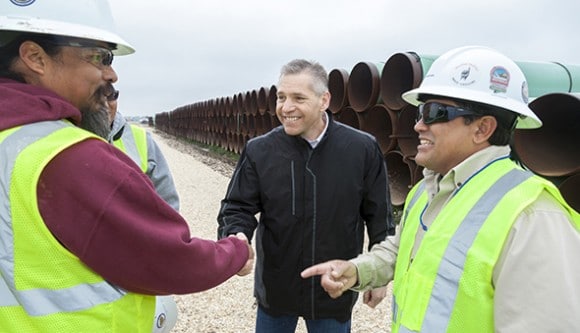Last week internal documents from Edelman, the world’s largest PR firm, were leaked to Greenpeace, exposing an aggressive strategy to target opponents of TransCanada’s Energy East pipeline.
The release of the documents brought TransCanada under fire for using dirty public relations tricks to manipulate public opinion and divide communities on the issue of the company’s 4,600 km Energy East pipeline that will carry 1.1 million barrels a day of Alberta oilsands crude to one small refinery and to export facilities on the east coast.
Today a press release from Edelman confirms the firm is parting ways with TransCanada after “attention…moved away from the merits of TransCanada’s Energy East Pipeline project.”
According to the release, “Edelman and TransCanada have mutually agreed not to extend Edelman’s contract beyond its current term,” which completes at the end of December.
The release also states the communications strategy Edelman devised was meant to “drive an active public discussion that gives Canadians reason to affirmatively support the project.”
But critics have been quick to point out that Edelman has a reputation for dirty corporate campaign strategies.
The leaked documents show the TransCanada strategy included tactics for undermining opponents of the Energy East pipeline and for manufacturing fake grassroots groups, or astroturf groups, that would give the public the impression of genuine community support for the pipeline.
Edelman recommended TransCanada target Energy East opponents by “distracting them from their mission and causing them to redirect their resources.”
The firm also suggested the pipeline company work with “supportive third parties who can in turn put the pressure on, particularly when TransCanada can’t.”
Edelman makes reference to other major oil companies, such as ExxonMobil, Chevron, Shell and Halliburton, that employ similar PR tricks.
The firm also noted its work with other major oil industry lobby groups, such as the American Petroleum Institute to promote the Keystone XL pipeline, malign opponents of fracking and fight climate legislation and renewable energy.
The revelation of Edelman’s TransCanada strategy came on the heels of another major leak that casts a shadow over oil industry PR.
Earlier this month an industry executive leaked a secret audio recording of PR veteran Richard Berman candidly outlining aggressive, high-pressure tactics for manipulating public opinion surrounding environmental and conservation groups.
Berman’s strategy — to “win ugly or lose pretty” — targeted opponents of fracking as well as other climate and anti-pipeline activists.
Berman, who was referred to as Dr. Evil in a 60 Minutes segment, told industry executives to think of the anti-environment battle “as an endless war” that industry must be prepared to pay for.
In light of Edelman’s leaked documents, TransCanada told the Globe and Mail the company was wary of pipeline opponents who have successfully stalled the approval of the Keystone XL pipeline in the U.S.
TransCanada spokesman James Millar told the Globe that, with Energy East, the company was eager to gain supporters and limit the impact of opponents. Millar also noted TransCanada opted out of some of Edelman’s strategy suggestions, such as secretly funding pro-pipeline citizen groups.
Public opposition to Energy East recently escalated after author and activist Gabriel Nadeau-Dubois donated his $25,000 Governor General’s Literary Award to an anti-pipeline online fundraiser. The crowdfunding site has now received more than $330,000 in donations to fight Energy East.
In today’s press release Edelman stated, “We stand by our strategy. It was both ethical and moral, and any suggestion to the contrary is untrue.”
The release concluded: “Unfortunately, the conversation about our efforts has become so loud in certain areas that it is impossible to have an open and honest conversation about the pipeline project. The project is too important and a thoughtful, deliberative conversation is needed more than ever. For that reason we feel that selection of a new partner for the project is necessary at this time so a new conversation on the merits of the project can begin.”
Update: TransCanada also released a statement about the break-up, which you can read in full below:
The Energy East project makes sense for Canada. For the first time, western Canadian oil will be able to travel safely by pipeline all the way to Quebec and beyond to the east coast, strengthening Canadian energy security and offering direct local economic benefit all along the pipeline route.
Regrettably, recent controversy around our communications strategy has created distraction most notably in Quebec. Media reports have incorrectly suggested that TransCanada’s communications practices are unacceptable. The conversation about Energy East has turned into a debate about our choice of agency partner. We need to get back to a conversation about the project itself and as a result we have agreed that it is in the best interests of the project that we do not extend our contract with Edelman.
In the current environment, we can’t have the respectful conversation that we want to have with Canadians and Quebecers about Energy East. We need to discuss the project on its merits, responding to valid concerns such as how we will protect water and marine life, instead of talking about communications tactics.
We are therefore starting a fresh conversation with all stakeholders. We want to be part of eastern Canadian communities for decades to come, and we want to do everything that will enable us to earn the trust of Canadians for the long-term.
You can also view our statement on the Energy East blog in English or French.
Thank you,
Tim Duboyce
Spokesperson,
Energy East Pipeline Project
Image Credit: TransCanada
Subscribe to our newsletter
Stay up to date with DeSmog news and alerts







